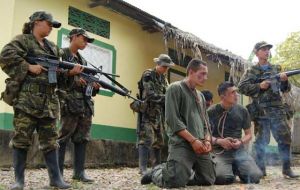MercoPress. South Atlantic News Agency
FARC reiterate call for a Colombia truth commission at Havana peace talks
 Last month FARC partially accepted responsibility for the thousands of deaths as a result of the half a century internal warfare
Last month FARC partially accepted responsibility for the thousands of deaths as a result of the half a century internal warfare Colombia’s Marxist rebel organization, FARC reiterated on Wednesday its call to the Colombian government to establish a truth commission to deal with the history of the internal conflict in the country that goes back to 1964.
Laura Villa, a member of the FARC delegation participating at the peace talks in Havana since November, asked the government to accelerate its response to the country on the formation of that commission.
The General Report from the Historical Memory Group, promoted by the government, must be reviewed and completed by an independent commission to sound out the causes of the confrontation, she said.
Villa added that in order to adequately study the violence by the various parties and its impact on subsequent events, the files from intelligence agencies, the Police and the Army, and other secret entities must be opened.
She also urged study of documents from the Council of Ministers, which she claimed are a collection of warrant-less arrest orders issued by the government, “infringing upon the fundamental rights of Colombians”.
“The government must make every effort to make the establishment of this Commission a reality, in order to deal with the unavoidable responsibilities for those who have been part of the conflict, beyond the rebels,” she said.
FARC (Colombia revolutionary armed forces) last month partially accepted responsibility for the thousands of deaths as a result of the long struggle with Bogota.
FARC negotiator Pablo Catatumbo stated on the sidelines of peace negotiations “without a doubt, there has also been cruelty and pain provoked by our forces. Still, we must recognize the need to approach the issue of victims, their identification and reparations with complete loyalty to the cause of peace and reconciliation”.
Catatumbo is the third highest FARC commander and the second most important FARC representative in the peace delegation in Havana.
Catatumbo renewed FARC calls for the creation of an international “truth” commission, similar to the one in South Africa that followed the downfall of the apartheid regime there, to investigate nearly five decades of “fratricidal conflict” in Colombia.
Catatumbo told reporters, “This commission in our opinion should be formed immediately,” calling on “the entire country to hold a day of reflection and contrition.” In July a Colombian government commission last month reported that roughly 220,000 people have lost their lives in Latin America's oldest guerrilla armed conflict, while other estimates put the number of casualties as high as 600,000.
FARC is believed to have about 8,000 armed fighters. Colombia has Latin America's fourth largest economy, but the distribution of wealth is highly unequal, with a report by the National University of Colombia noting that only 13.8% of total national income is allocated to the poorest 50% of the population, while the wealthiest 10% of the population benefits from 46.5%.
FARC has focused many of its attacks on the country's infrastructure. FARC specializes in oil infrastructure attacks, particularly the 500 mile-long 80,000 barrel per day Cano Limon-Coveñas pipeline, the world's most heavily attacked oil infrastructure. In 2001, the pipeline was attacked 170 times. A decade later, by the first half of 2012, Colombia's state-owned oil company Ecopetrol pipelines and production facilities were attacked 67 times, with Cano Limon-Coveñas pipeline having been attacked so frequently that locals call it “la flauta” (the flute) because of the perforations punched in it by guerrillas.




Top Comments
Disclaimer & comment rules-

-

Read all commentsA framework for peace processes like these ones are always complicated to establish. Hopefully they'll get it right. I don’t understand how the law (civil or military courts?) is supposed to recognize precisely the difference in the cases in which army officers are just simply carrying out orders from above from those abusing human rights and committing manslaughter.
Sep 18th, 2013 - 11:07 pm 0Here in Argentina we have had trials in the 80s against the top Junta members that run the country during the dirty war, then came the amnesty for all sides in the 90s, and after that we had the witch hunt in the kirchnerist decade, while ex ERP, Montoneros and other former left wing terrorist organizations still benefit from the amnesty and are still patronized by the government....Also if you want justice in Colombia, besides the FARC and the Army, by fairness you need to take to court the Paramilitares that were successfully disbanded by President Uribe
Indeed I think it's time to take into account the human rights violations committed by the State and find ways to look who's responsible for what. I d'on't say this because I'm a FARC supporter, I simply say this because I read in the news, everywhere, about punishment for FARC members while nobody talks about the government crimes, as if the've never existed. As the FARC say in one of their documents: the State can't be part, and at the same time judge of the conflict, and that's, according to them, one of the negative aspects of the framework http://goo.gl/hAnwOc.
Sep 19th, 2013 - 10:48 am 0The victims of crimes of the State are people, too, and there are thousands of them.
Commenting for this story is now closed.
If you have a Facebook account, become a fan and comment on our Facebook Page!